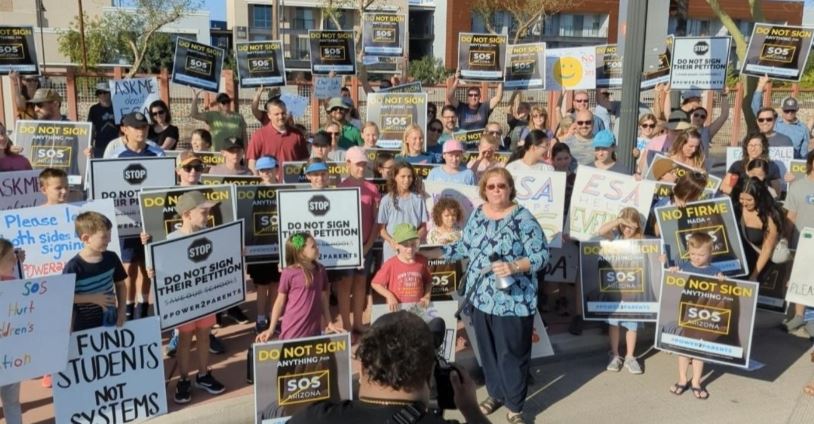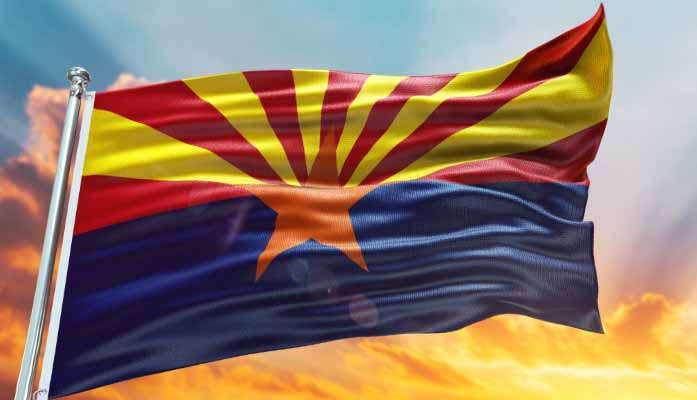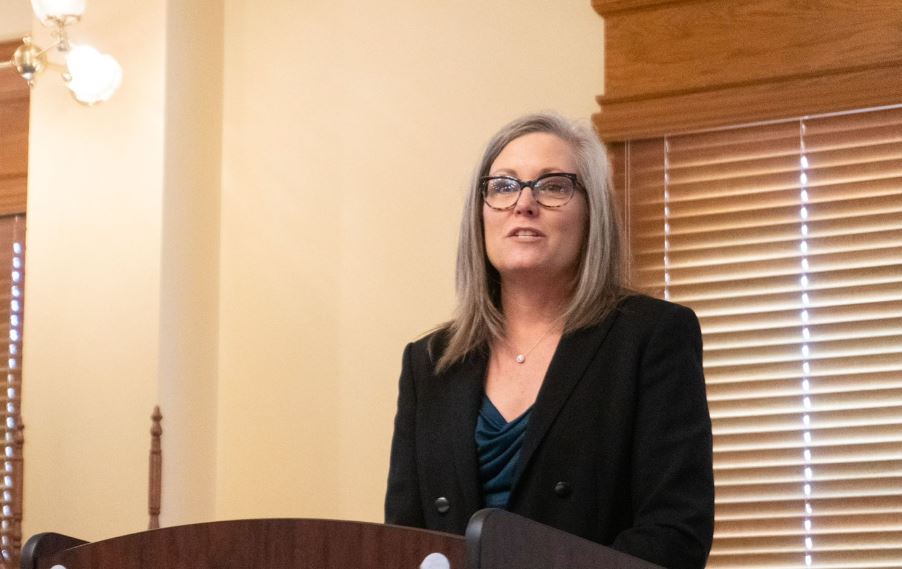
New Version Of ESA Handbook Delayed After Parents Express Dismay
By Staff Reporter |
Arizona Republican lawmakers and concerned parents won a recent victory to protect the state’s universal school choice program from a volley of new regulations.
Over this past weekend, Arizona legislators were involved in a battle over the Draft Parent Handbook for the ESA Program for School Year 2024-2025. Unbeknownst to many ESA families, the handbook was posted to the Arizona State Board of Education’s website – linked to an agenda item – with multiple proposed changes of a significant nature, giving interested parties mere days to leave feedback. The recommendation from the Department was for the State Board of Education to adopt the revised handbook when it convened on Monday, March 25.
A group of parent-stakeholders, led by a long-time watchdog of the ESA program, Christine Accurso, discovered the existence of the handbook and poured through its contents, finding numerous examples of added regulations for students and families. They compiled the list and notified as many other parents as possible.
The parents also reached out to Republican lawmakers, who were shocked to learn about the lack of transparency and the efforts to overregulate the program, which was contrary to the legislative intent. Senators Jake Hoffman and Wendy Rogers, among others, immediately sprang into action to stop the revised handbook from becoming Department policy.
Thanks to the legislators’ and parents’ involvement, the State Board of Education ultimately reversed course on its initial recommendation, voting to maintain the previous year’s handbook with no changes.
Save Our Schools Arizona Director Beth Lewis, who has been a staunch opponent of the ESA program, was extremely disappointed with the outcome from the State Board of Education. After the Board’s vote, she said, “The proposed regulations rejected by Supt. Horne and Republican lawmakers would have provided a thin veneer of oversight for Arizona taxpayers.”
One of the ESA parents, Kelly Kenney, told AZ Free News, “I was shocked about the increased regulations because the new handbook changes will limit the educational opportunities for my child. This would directly impact her access to the type of resources that she absolutely needs. If the ESA program was supposed to be regulated in this way, it would spell it out in the statutes. I’m very glad the State Board saw things our way and sided with the parents in this program.”
The Arizona Department of Education’s “X” account issued a short statement following the vote from the State Board, writing, “Superintendent Horne is thankful for Senate President Warren Petersen and Arizona Senate Republicans for helping garner support from the state board of education to allow more time for input from parents on the ESA handbook.”
In the days leading up to the State Board of Education meeting, Republican legislators had several conversations with individuals at the Arizona Department of Education, informing them of their displeasure with this action and holding them accountable to the original intent of the ESA law. To ensure that ADE understood the seriousness of the situation and the resolve of legislative Republicans, Senator Jake Hoffman wrote a letter to the State Board, which was signed by many of his colleagues, including Senate President Warren Petersen and House Speaker Ben Toma.
The letter stated that ADE’s “proposed changes restrict[ed] the program further than the Arizona State Legislature intended.” It also highlighted “the failure to allow for public engagement, comment, or input in the shaping of these new regulations,” calling this “incredibly concerning.” Two requests were made of the State Board of Education in this communication. The first was to reject the draft handbook and greenlight the 2023-2024 handbook for another school year. The second was to “form a stakeholder working group consisting primarily of ESA parents, private school administrators, and home schooling parents” for the 2025-2026 handbook.
In an exclusive comment to AZ Free News, Senator Hoffman explained why he took the lead against the proposed changes in the draft ESA handbook. He said, “Transparency and robust public input from those most impacted by these regulations are critically important. Unfortunately, the system failed the Arizona families who rely on empowerment scholarship accounts for the educational success for their children. Thankfully Superintendent Horne and the State Board of Education took the opportunity to remedy this failure. Their decision to reject the deeply flawed 2024-2025 handbook, and instead adopt the current handbook until ESA families and educational providers have a multi-month opportunity to engage with ADE staff on the next handbook was the right move for the children relying on this incredible program.”
Just before the legislators’ letter was delivered to the State Board of Education on Friday evening, the ESA Executive Director wrote an email of his own to ESA families with the “ESA Program Response to Misinformation.” The director stated that “incorrect information has made it into the public dialog regarding payment of ESA purchases…that ESA account holders will not be paid for their allowable purchases until after they have completed an educational program.” The director also noted that the draft handbook had been posted on the State Board of Education’s website since Friday, March 15. Sources told AZ Free News that the alleged complaint was one that they had not seen lodged against the draft handbook and that none of the other concerns brought by parents about proposed changes in ESA policy or guidance were addressed in the director’s email.
The director’s email to ESA families on Friday, March 22, was believed to be the first since January 24, when the program sent an “important update on new features from ClassWallet.” The director had previously sent three consecutive emails to families in late-December 2023. In one of those emails, the director asked parents to submit their “suggestions for specific changes…to [be] made to the ESA Parent Handbook.” The deadline for submissions was January 2, 2024 – four days after that email hit inboxes.
Another ESA parent, Rosemary McAtee, gave the following comment to AZ Free News: “I was appalled to learn how the education department was trying to slide a new handbook past the parents, to the state board, without any input from the parents. I am glad that members of the board voted to include us in the process by allowing more time for our input. This week was a win for ESA parents! I’ve been in this program for 5 years and every year there has been a public process. We really haven’t heard anything at all from the department in the past 7 months when we were accustomed to weekly email updates.”
Solicitation of public comment on changes for the 2024-2025 Draft ESA Handbook was handled much differently – and with less transparency – than the previous year’s redlines. Last year, ADE issued a press release and transmitted an email to ESA account holders to explain the proposed changes.
The uproar over the draft handbook follows another instance where a Republican legislator was forced to intervene in an issue raised by parents. In February, ESA parents asked Rogers to resolve the backlog of orders in the program, which was believed to be around 85,000 (or over four months old), according to sources. AZ Free News was made aware of at least one Arizona private school that experienced severe funding issues due to the lack of reimbursements for ESA students who attended.
After Rogers contacted ADE with her concerns and request to pick up the pace of reimbursements, the issue almost literally evaporated overnight. AZ Free News was told that thousands of orders may have been approved in mere hours – and many more followed in the following days.
In an interview with AZ Free News, Rogers explained why she chose to involve herself over the stockpile of orders from ESA families, saying, “Numerous constituents, including family members had become exceedingly frustrated at the slow turnaround time for reimbursements from the ESA program. People from all over the state wrote me. They know that I fight, and that I’m outspoken. So I began writing terse letters to the Arizona Department of Education and I got results for my people on an individual basis, one by one. Then the word got around among the ESA families and everyone began to write me. So I started inundating the department with these letters, every one of which was carefully and separately written in-depth describing how these reimbursement delays adversely impacted their ability to school their children.”
The rural Arizona state Senator added, “Then all of the sudden, I heard that thousands of ESA reimbursement approvals were done over one night with no scrutiny. This is not a way to run a business. This just feeds the controversy on whether or not expenditure approvals are correct or valid. The ESA program was running well last year. I heard from many families how well run it was. Now it has run amok. There is no excuse for it. It must be repaired. Our children are too important. The legislature put this ESA program in place and now it’s up to administrators to manage it properly.”
The former director of the ESA Program, Christine Accurso, was at the center of both episodes, continuing to be a sounding board for hundreds of parents and an effective liaison to the Republican-led legislature on behalf of stakeholders. After the positive action from the Board on Monday morning, Accurso wrote, “Superintendent Horne committed to having his team work with key stakeholders – mainly parents – in creating the next one. Many Republican lawmakers stepped up to help their constituents, after receiving hundreds of emails this past week, and their advocacy paid off. As an advocate, defender and watchdog of this program for the past 10 years, I am so glad to see this outcome. This is exactly what we wanted and needed to have happen. The parents who attended and spoke at the board meeting did a great job advocating for their children’s education.”
When Accurso inherited the ESA Program in January 2023, there were over 60,000 orders for marketplace, direct pay, and reimbursements. Even with a steady increase of new enrollees adding a significant amount of orders to the existing backlog, Accurso and her team managed to whittle the requests down to essentially ‘zero,’ and drastically minimize the delay in response time to parents.
AZ Free News is your #1 source for Arizona news and politics. You can send us news tips using this link.




